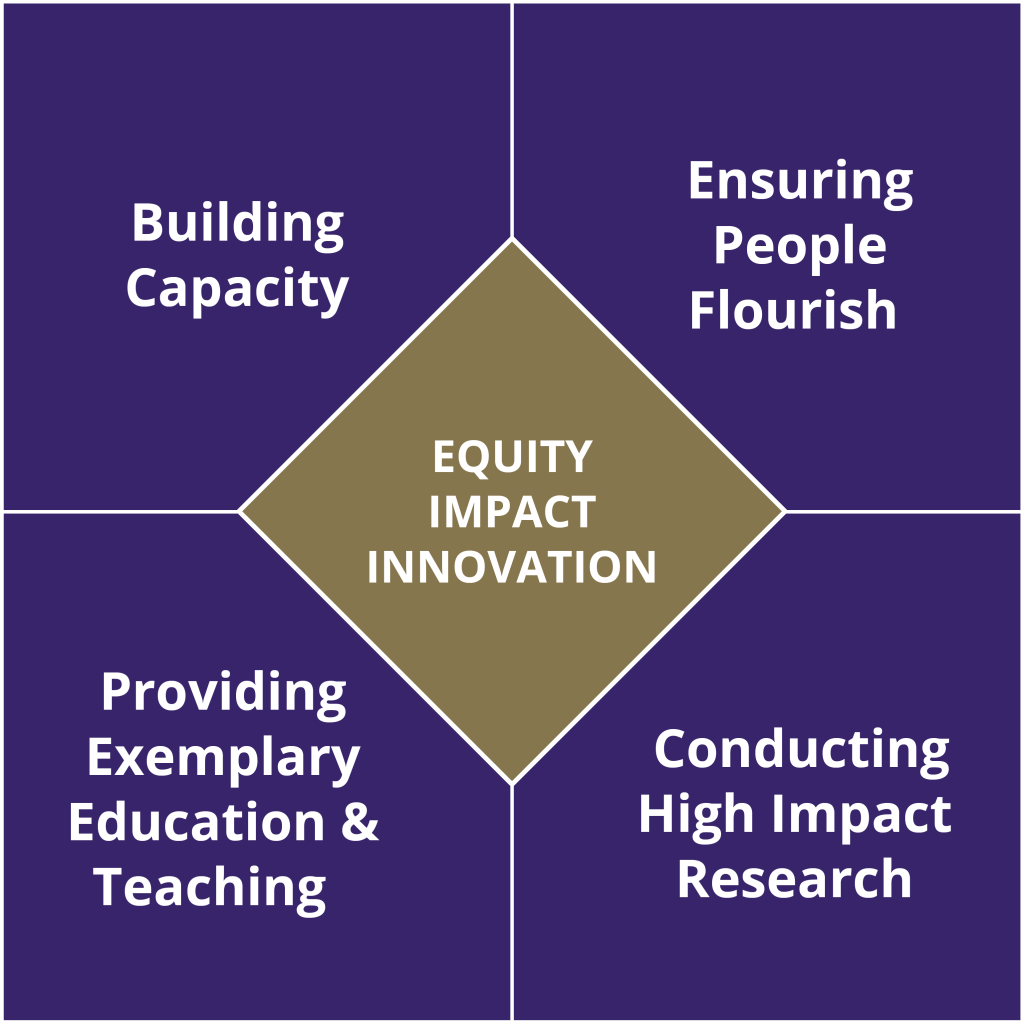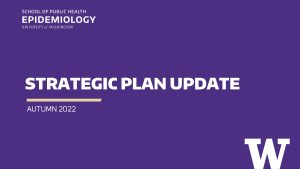Strategic Plan 2022–2025
In 2021, the University of Washington Department of Epidemiology (UW Epi) embarked on a strategic planning process, engaging students, staff, faculty, and partners, and reflecting on our department’s mission, commitment to anti-racism, and envisioning a future for UW Epi that aligns around our values of equity, impact, and innovation.
The resulting goals outlined in our 2022–2025 Strategic Plan are ambitious and achievable. We heard the call from our community to do better in identifying our role in longstanding inequities and then acting to undo them. With a clearer understanding of what success looks like, together we can outline the strategies to get there.
The next three years will require all of our participation and openness to growth. Thank you to everyone who has influenced, challenged, and inspired us to dream bigger as we envision the future of UW Epi, one which maximizes our contribution to our field and the world.
Strategic Vision

BUILDING CAPACITY
We have the knowledge, skill, time, and money needed to accomplish our mission.
Outcome 1 – Increase resources that enhance the department’s mission.
- Evaluate and implement opportunities for new and existing funding sources
- Increase faculty and student skill in writing and receiving diversity supplements
- Shift how we work in order to increase alignment with equity and impact
- Increase engagement efforts to drive additional funding
Outcome 2 – Black, Indigenous, and People of Color (BIPOC) staff, faculty, and students can easily access services and financial resources they need to succeed.
- Better connect people to existing resources
- Understand the needs and build mechanisms to stay informed and responsive over time
Outcome 3 – Leadership makes active and visible decisions to shift department operations to further an anti-racist culture for all.
- Operationalize equity & anti-racism through key organizational functions
- Leadership is aware of and responsive to impacts of racism on the department climate
- Build skills across the department in EDI research methodologies and practical applications
- Build in accountability for growth
ENSURING PEOPLE FLOURISH
The department flourishes when we focus on ensuring people with diverse lived experiences flourish.
Outcome 1 – Recruitment, hiring, and promotion processes align with best practices on anti-racism and equity.
- Define success in recruitment and hiring of faculty and staff, and collect data to gauge progress
- Align recruitment and hiring processes for faculty and staff to best practices
- Include expectations for anti-racism in performance reviews and promotions for faculty and staff
- Expand student recruitment and outreach efforts, aligning to best practices
Outcome 2 – Increase quality and accessibility of mentor relationships, with an emphasis on equitable, anti-racist frameworks.
- Learn what students want and need from mentors
- Improve systems to connect students with mentors more easily
- Formalize clear standards for mentors, using a framework that operates through the lens of race-, identity-, disability-, and class-consciousness
Outcome 3 – New and existing partnerships benefit communities and expand breadth and quality of learning opportunities.
- Build a supportive environment for partnerships to be nurtured
- Leverage existing opportunities for partnerships that build EDI skills
- Increase the visibility of UW Epi
CONDUCTING HIGH IMPACT RESEARCH
Our research furthers equity, makes an impact where needs are the greatest, and is innovative in its approaches.
Outcome 1 – The department has established a systematic process for getting community input on research priorities and activities.
- Build a supportive context for community-defined research collaborations
- Deepen relationships that help us align better with community research priorities
- Establish a process to align research with community needs
Outcome 2 – Faculty and students are skilled in how to apply research methods that are innovative and further equity and anti-racism.
- Deepen skills of existing faculty around methods that further equity and anti-racism
- Bring additional skills and perspectives into the classroom to further equity and anti-racism
PROVIDING EXEMPLARY EDUCATION & TEACHING
Teaching prepares students to be responsive to the problems of today and is innovative in both methods and topics.
Outcome 1 – Curriculum content and offerings successfully prepare students for the problems of today and the future.
- Existing curriculum content is assessed… and improved
- Curriculum offerings are expanded to create a practical, anti-racist, and accessible student experience.
Outcome 2 – Faculty are equipped to facilitate a rich, equitable, and anti-racist learning experience.
- Leverage existing opportunities for learning
- Create a supportive environment for growth
Please contact Cassie Atkinson-Edwards with any questions regarding the strategic plan.
